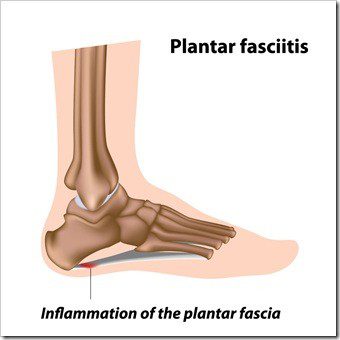
Step. Jump. Leap. Balance and turn. Although these sound like dance steps, they are just some of the simple activities that our feet perform every day. Most of us are completely oblivious to the dependence that we have on our feet and until we are alerted by pain in the foot or heel. This discomfort can be caused by many different reasons. One particular type of pain which is identified as an inflammation in the ligament of the plantar fascia is found to be the most debilitating due to the fact that the ligament is used every time you take a step.
What is Plantar Fasciitis?
Plantar Fasciitis is a condition that occurs when there is chronic inflammation to a large band of tissue on the bottom of your foot called the plantar fascia. The Plantar Fascia is the ligament that connects the ball of your foot to your heel and can sometimes be overstretched which leads to severe pain in the heel. The cause of this condition is not fully understood, but it is more commonly found in females and overweight people. Frequently on x-rays, a heel spur is see but is not commonly the source of the pain. When both feet are involved, this is sometimes associated with a certain type of arthritis, which can be evaluated with a simple exam and tests by your doctor.
Other Risk Factors:
Factors that will put strain on the plantar fascia are standing for long periods of time and being overweight with bad posture and or incorrect shoes. Those people with flat feet, have rolling in on the feet or high arches are also at a greater risk of developing plantar fasciitis. All of these factors contribute to a weakening of the foot and therefore strengthening and attention to the foot mechanics is essential.
Great Strengthening Tips for the Plantar Fascia:
- Sitting on the floor with your legs straight out in front of you, loop a towel or belt around the ball of your foot and pull back slowly until you feel a good pull in your calf muscle. Hold for 30 seconds and repeat 3 times. Repeat with the other leg.
- Stand facing a wall at about arm’s length and lunge forward with one leg while keeping the other behind you with the heel flat on the floor. You should feel the stretch in the calf muscle. Hold for 30 seconds and then switch to the other leg. Repeat the sequence a few times a day.
- To stretch the plantar fascia, use a wall or stair to press the bottom your toes against so that they extend upward, while the ball of your foot remains touching the floor. Hold for 45-60 seconds on each foot and repeat twice. Sports doctors recommend this be done twice a day.
- Massaging the plantar fascia by rolling your foot slowly back and forth over a rolling pin or drink can for a few minutes each day can also help to relieve and inflammation that is affecting the plantar fascia.
If you are suffering with Plantar Fasciitis avoid any exercises that require a repetitive motion and force with a hard surface on the foot, such as running or jogging until it has been corrected.
Ready to Help!
Our expert team is here to assist you on your road to recovery. Please call today for a examination and consultation and take that first step to recovery.
For Your Health,
Dr. Steven M. Gillis

